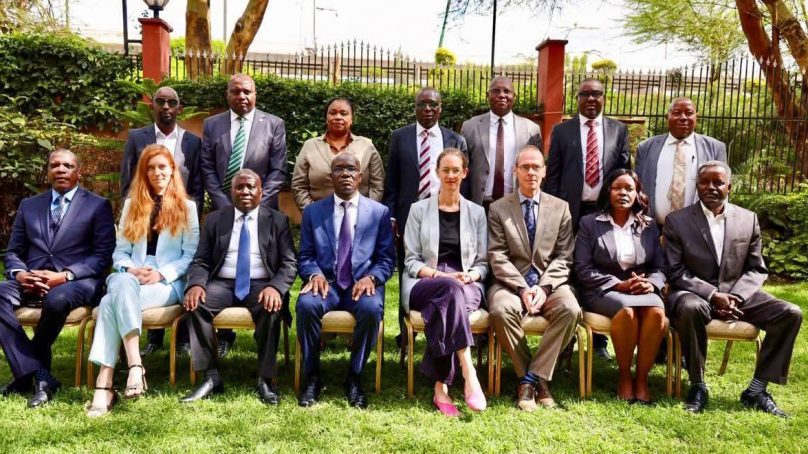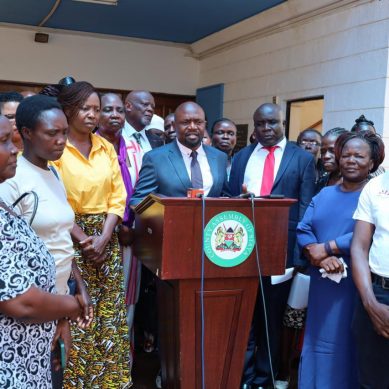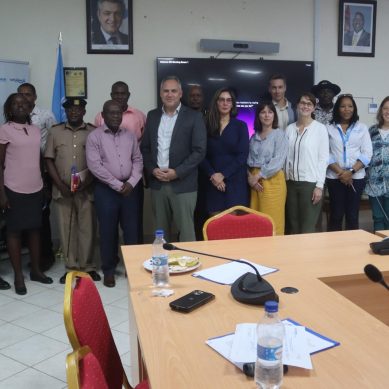
Kenya, through the Ministry of Information, Communications and Digital Economy drafting the National Data Governance Policy.
The policy is being developed in partnership with the European Union (EU) and the Federal Ministry of Economic Cooperation of Germany through the German Corporation for International Cooperation (GIZ) Digital Transformation Centre (DTC).
The draft process was officially launched by the Principal Secretary for Economic Planning Boniface Makokha and ICT and Digital Economy Principal Secretary John Tanui among other representatives from government institutions, development partners, the private sector, academia and civil society during a one-day workshop held at the Ole Sereni Hotel Monday.
In his keynote address, Dr Makokha noted the Data Governance Policy will shape how Kenya treats data as a foundation of the country’s social-economic transformation in the 21st century by driving growth, inclusion and innovation.
“Data is the lifeblood of modern planning and decision making. In the State Department for Economic Planning, we see this daily in data-driven policies. Unlike other resources that are sector specific, data is cross-cutting, it flows between national and county governments, between ministries and agencies, and across public and private sector,” Makokha said.
He noted that with good data governance, Kenya will be able to forecast economic trends, identify risks early and seize opportunities faster; empower counties to plan development projects that respond directly to the needs of citizens in addition to protecting citizen’s rights and building public trust.
Further called on the ministry to appoint a multi stakeholder steering committee that ensures inclusivity; promotes accountability and one that will draft a policy that reflects the aspirations of all Kenyans.
Tanui noted that globally, nations that thrive are those that treat data not merely as information but as a strategic national asset which fuels innovation, drives economies, enhances governance and touches every aspect of our lives.
The principal secretary said Kenya boasts one of the most mature data protection environments on the continent – anchored by the Data Protection Act (2019) and the Office of Data Protection Commissioner (ODPC).
He further noted that the launch of the National Artificial Intelligence Strategy 2025-2030 among other frameworks have positioned Kenya as a pioneer in Africa’s digital transformation and a trusted player in the global data economy.
“At the core of all these initiatives is data. We must not only protect it, we must unlock its value. The vast amounts of data we generate, collect and store must become engines of inclusive growth, innovation and improved public service delivery.
We eagerly anticipate the insightful deliberations that will take place during this forum and in subsequent engagements. As a government, we are keen to receive actionable recommendations that will guide our policy formulation efforts,” added Eng Tanui.
German Embassy Deputy Head of Cooperation Friederike Hemker noted that Germany, through GIZ, is proud to support this initiative as part of its longstanding development cooperation.
Hemker commended Kenya for taking the decisive and ultimately transformational step in defining its data governance regime and for being a key player in shaping digital realities as evidenced by the considerable contribution and consistent participation in the development of an EAC Data Governance Policy Framework.
“As Germany, we firmly believe in a future where the use of data is done fairly, inclusively and securely. We recognise the transformative potential of responsible data use, and it has become imperative to establish clear guidelines and ethical standards on handling data,
“We remain committed to Kenya in its efforts to build a resilient and prosperous data governance ecosystem harmonised with the African Union Data Policy Framework and International best practices,” Hemker pledged.
The objective of the workshop was to launch the process of developing the policy, seek stakeholder commitment to participate in the process; make initial presentation on the terms of reference, methodology, timelines, initial stakeholder analysis and emerging data governance policy gaps; obtain initial inputs from stakeholders in addition to communicating the next steps and opportunities for stakeholders to participate in the process.
- A Tell Media / KNA report / By Rachael Kilonzo







